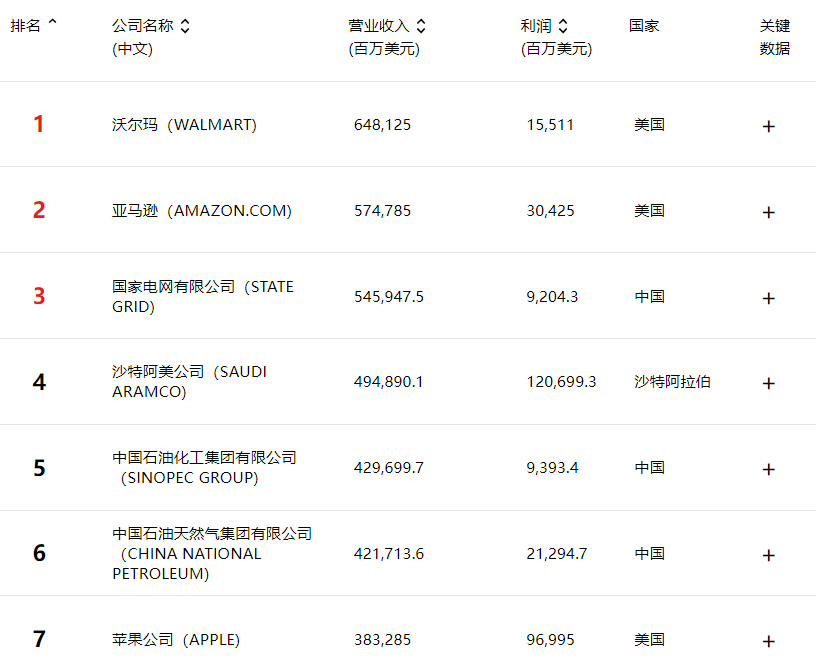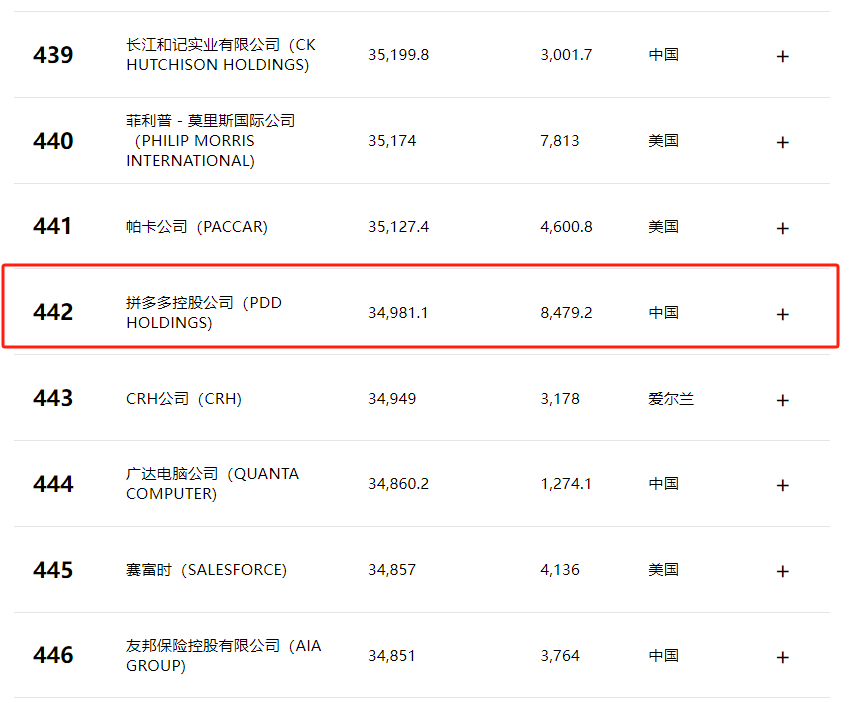Fresh "Fortune Global 500" List: PDD Won The Game First Time
PDD made its debut on 2024 Fortune Global 500 list with revenue of $34.981 billion.
On August 5, Fortune released the 2024 Fortune Global 500 list.
Overview
According to reports, the total revenue of the companies on this year's Fortune Global 500 list is approximately $41 trillion, equivalent to one-third of the global GDP, and a slight increase of about 0.1% compared to last year. The threshold for making the list (minimum sales revenue) rose from $30.9 billion to $32.1 billion.

In terms of revenue, Walmart remains the world's largest company for the 11th consecutive year, with a revenue of $648.125 billion and a profit of $15.511 billion. Amazon regained the second position thanks to dual measures of expanding revenue and cutting costs, with a revenue of $574.785 billion and a profit of $30.425 billion. China's State Grid remains in the third place, followed by Saudi Aramco and Sinopec in fourth and fifth positions, respectively.
This year, including companies from Taiwan, China has 133 companies on the list, with a total revenue of about $11 trillion, a year-on-year decrease of approximately 6%, and an average sales revenue of about $83 billion.
Additionally, benefiting from the recovery of the internet industry, major Chinese internet giants saw an overall rise. Among the two internet giants, except for Alibaba (ranked 70th), which dropped by 2 places, JD.com (ranked 47th), Tencent (ranked 141st), and Meituan (ranked 384th) all saw improvements in their rankings.
PDD As One of the Top 500
Notably, PDD became a new entrant on the list, ranking 442nd with a revenue of $34.981 billion.

Although its ranking is not high, its 32.1% return on equity (ROE) ranks 47th among Chinese companies, and its 24.2% net profit margin ranks 17th among all Fortune Global 500 companies, making it the most profitable mainland Chinese company after China Merchants Bank.
In terms of growth rate, PDD shows great potential. In 2020, just five years after its founding, PDD made its debut on the Fortune China 500 list, ranking 321st with a total revenue of $3.01 billion. In just four years, it has skyrocketed into the Global 500, an achievement described as legendary.
The financial report shows that in 2023, PDD's annual revenue increased by 90% year-on-year. In the first quarter of 2024, its revenue recorded $8.68 billion, a year-on-year increase of 131%, and its net profit increased by 246%.
Capital Surges Worldwide
PDD: Normalized Promotions
Domestically, PDD has successfully solidified its mythical status as a low-price platform through various promotional strategies.

In the increasingly competitive domestic market, keeping up with the competition has become essential. During the 618 shopping festival, PDD announced that it would provide traffic to merchants who lower prices, increasing site-wide traffic weight by up to 9 times, and the prices of orders placed during the 618 period would not count towards the historical lowest prices.
Additionally, the "automatic price adjustment" feature was introduced. After merchants activate this feature, the platform will automatically adjust product prices based on the product's sales performance across the web and platform marketing activities within a specified time and price range. PDD later expanded this feature, further enhancing the platform's control over merchants' products, making this service cover all the merchants' products.
As a result, PDD has launched an unprecedented price war in the e-commerce industry.
Shortly after the end of the 618 shopping festival, PDD launched a summer promotion recruitment, using the "order grabbing tool" to precisely target consumers with purchasing intentions, firmly capturing their consumer psychology.
Temu: Overseas Expansion
In the third quarter of 2022, PDD's cross-border e-commerce platform, Temu, emerged, replicating its domestic strategy—"focusing on lower-tier markets, adhering to a user-first, efficiency-first, and absolute low-price approach"—combined with semi-managed and fully managed models, lowering the entry threshold for merchants while heavily investing in advertising. These strategies significantly reduced the costs for small and medium-sized merchants to go abroad, providing PDD with high-speed development opportunities in cross-border business.
Within just one year, Temu, with a GMV of $18 billion and 467 million MAU, became the second-largest e-commerce platform in the U.S. after Amazon. Currently, Temu covers 70 countries and regions in North America, Oceania, Europe, and Asia, and its overseas expansion shows no signs of slowing down.

In the third quarter of 2023, PDD's revenue reached $68.84 billion, a year-on-year increase of 94%, far exceeding market expectations. Among this, Temu's transaction service revenue alone was as high as $29.153 billion, a year-on-year increase of 315%, accounting for the majority of the revenue.
According to the list, PDD's success reflects how an emerging e-commerce platform quickly gained a foothold in the market by deeply understanding the needs of lower-tier market users.
E-Commerce War Escalates
PDD's case provides more inspiration for the business paths of world-class enterprises. However, in the new round of competition in the e-commerce industry, price wars are like "one man's meat is another man's poison," and major platforms have reconsidered their business strategies.
Recently, Taotian and Douyin announced their exit from purely low-price competition.
Taobao has not only relaxed the "refund only" policy and launched a new "experience score" system to reduce or eliminate after-sales intervention for high-quality stores but also plans to introduce a new after-sales negotiation tool to meet the needs of merchants and consumers for autonomous negotiation. Douyin E-commerce will adopt more refined strategies to enhance the overall service experience, aiming to allow users to buy "good products at good prices."
However, bidding farewell to price wars does not mean abandoning the "low price" weapon. Understanding and meeting consumer needs, and providing quality, sustainable low prices, will be key to standing out in future competition.
Consumer spending drives e-commerce revenue growth, while merchant retention is the foundation for sustained competition in e-commerce. Balancing the interests of both and creating a healthy platform ecosystem and transaction chain are exactly issues that e-commerce platforms need to ponder.
·Original
Disclaimer: The views in this article are from the original Creator and do not represent the views or position of Hawk Insight. The content of the article is for reference, communication and learning only, and does not constitute investment advice. If it involves copyright issues, please contact us for deletion.